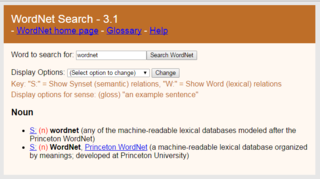
WordNet is a lexical database of semantic relations between words in more than 200 languages. WordNet links words into semantic relations including synonyms, hyponyms, and meronyms. The synonyms are grouped into synsets with short definitions and usage examples. WordNet can thus be seen as a combination and extension of a dictionary and thesaurus. While it is accessible to human users via a web browser, its primary use is in automatic text analysis and artificial intelligence applications. WordNet was first created in the English language and the English WordNet database and software tools have been released under a BSD style license and are freely available for download from that WordNet website.
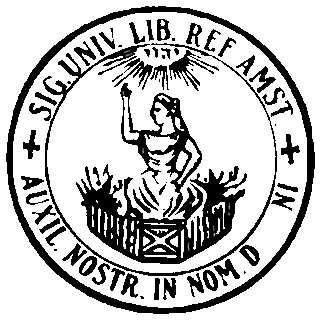
The Vrije Universiteit Amsterdam is a public research university in Amsterdam, Netherlands, being founded in 1880. The VU Amsterdam is one of two large, publicly funded research universities in the city, the other being the University of Amsterdam (UvA). The literal translation of the Dutch name Vrije Universiteit is "Free University". "Free" refers to independence of the university from both the State and the Dutch Reformed Church. Both within and outside the university, the institution is commonly referred to as "the VU". Although founded as a private institution, the VU has received government funding on a parity basis with public universities since 1970. The university is located on a compact urban campus in the southern Buitenveldert neighbourhood of Amsterdam and adjacent to the modern Zuidas business district.

Robertus Henricus "Robbert" Dijkgraaf FRSE is a Dutch theoretical physicist, mathematician and string theorist, and the current Minister of Education, Culture and Science in the Netherlands. From July 2012 until his inauguration as minister in January 2022, he had been the director and Leon Levy professor at the Institute for Advanced Study in Princeton, New Jersey, and a tenured professor at the University of Amsterdam.

Hendrik Willem Lenstra Jr. is a Dutch mathematician.

Henkjan Honing is a Dutch researcher. He is professor of Music Cognition at both the Faculty of Humanities and the Faculty of Science of the University of Amsterdam. He conducts his research under the auspices of the Institute for Logic, Language and Computation, and the University of Amsterdam's Brain and Cognition center.

Daan Frenkel is a Dutch computational physicist in the Department of Chemistry at the University of Cambridge.

Peter Nijkamp is a Dutch economist, Professor of Regional Economics and Economic Geography at the Vrije Universiteit, Amsterdam, the Netherlands, a fellow of the Tinbergen Institute and President of the Governing Board of the Netherlands Research Council (NWO). He is ranked among the top 100 economists in the world according to IDEAS/RePEc, and is by far the most prolific economist. Towards the end of his career at the VU university Nijkamp faced accusations of self-plagiarism and VU-appointed investigators have criticised referencing methods in some of his work.
Martin Vinzenz Baldur Paul Maria (Martin) van Hees is a Dutch philosopher.

Amsterdam University College (AUC) is a public liberal arts college in the Netherlands with an enrolment of about 900 students from more than 60 countries. All teaching is in English.

Maarten de Rijke is a Dutch computer scientist. His work initially focused on modal logic and knowledge representation, but since the early years of the 21st century he has worked mainly in information retrieval. His work is supported by grants from the Nederlandse Organisatie voor Wetenschappelijk Onderzoek (NWO), public-private partnerships, and the European Commission.

Frederick "Rick" van der Ploeg is a Dutch economist and former politician.

Ineke Sluiter is a Dutch classicist and professor of Greek Language and Literature at Leiden University since 1998. Her research focuses on language, literature, and public discourse in classical antiquity. She was a winner of the 2010 Spinoza Prize. Sluiter has been president of the Royal Netherlands Academy of Arts and Sciences since June 2020, and previously served as vice president from 2018 to 2020.
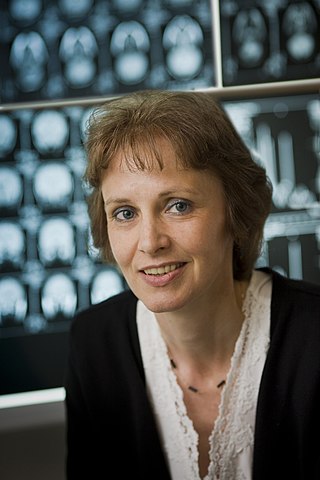
Marjo S. van der Knaap is a Dutch professor of pediatric neurology at VU University Amsterdam and the VU University Medical Center. She was a winner of the 2008 Spinoza Prize. Her research focuses on white matter disorders.
Tjitze Baarda was a Dutch professor of theology and Religious Sciences. He spent his career at the Vrije Universiteit Amsterdam (VU) and Utrecht University. He specialized in the four gospels of the New Testament.
Willem Gerrit "Wim" Mook was a Dutch isotope physicist.
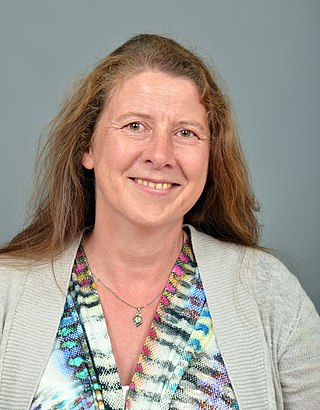
Corina Brussaard is a leading scientist for Antarctic viral ecology working for the Royal Institute of Sea Research (NIOZ) and is a Special Professor of Viral Ecology at the Institute for Biodiversity and Ecosystem Dynamics of the University of Amsterdam (UvA).
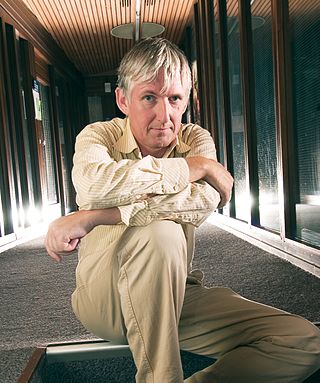
Jan Luiten van Zanden is a Dutch economic historian and professor of Global Economic History at Utrecht University. He is a widely acknowledged specialist in Dutch, European and Global Economic History.

Marileen Dogterom is a Dutch biophysicist and professor at the Kavli Institute of Nanoscience at Delft University of Technology. She published in Science, Cell, and Nature and is notable for her research of the cell cytoskeleton. For this research, she was awarded the 2018 Spinoza Prize.

Mirjam van Praag is a Dutch econometrician. She is the President of the Vrije Universiteit Amsterdam.
Marian Klamer is a linguist who specializes in Austronesian and Papuan languages. Her interests include the documentation of minority languages, Malay language varieties, linguistic typology, historical linguistics, and language contact.
















